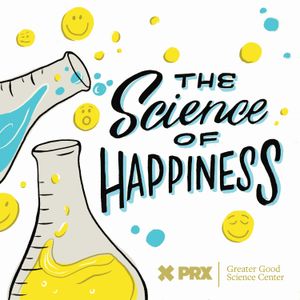
The Science of Happiness
PRX and Greater Good Science Center
How To Practice Gratitude When You're Not Feeling Grateful (Encore)

How To Practice Gratitude When You're Not Feeling Grateful (Encore)
Description
One way to feel more thankful for things is to imagine life without them. We explore a practice shown to help you see the bright side, even when you feel down.
We know gratitude is good for us, but what if we’re struggling to feel it? This week’s guest, author and podcast producer Stephanie Foo, finds herself missing her close-knit “chosen family” in California since moving to New York. Foo tries a practice called mental subtraction, where she imagines her life without New York.
Later, gratitude researcher Ernst Bohlmeijer shares how gratitude practices can reshape our emotions and possibly our whole outlook, and how the Mental Subtraction of Positive Events practice can be antidote to taking things for granted.
Practice:
- Take a moment to think about a positive event in your life. It could be a career or educational achievement or a special trip you took.
- Imagine yourself back in the time of this event. Think about the circumstances that made it possible.
- Ponder on the ways in which this event may never have happened. For example, if you hadn’t learned about a certain job opening at the right moment.
- Write down all of the possible events and decisions - large and small - that could have gone differently and prevented this positive event from occurring.
- Imagine what your life would be like now if you had not experienced this positive event and all the fruits that came from it.
- Remind yourself that this positive event did happen and reflect upon the benefits it has brought you. Allow yourself to feel grateful that things happened as they did.
Find the full Mental Subtraction of Positive Events practice at our Greater Good in Action website: https://ggia.berkeley.edu/practice/mental_subtraction_positive_events
Today’s guests:
Stephanie Foo is a radio producer and author of the book What My Bones Know: A Memoir of Healing from Complex Trauma.
Learn more about Stephanie and her book: https://www.stephaniefoo.me/
Follow Stephanie on Twitter: https://twitter.com/imontheradio
Follow Stephanie on Instagram: https://www.instagram.com/foofoofoo/
Follow Stephanie on Facebook:https://tinyurl.com/yx6pwdnf
Ernst Bohlmeijer is a psychology professor who studies gratitude at the University of Twente in The Netherlands.Learn more about Ernst and his work: https://tinyurl.com/2p92p6vn
Science of Happiness Episodes like this one:
- Four Great Gratitude Strategies: https://tinyurl.com/2p9buvkd
- Tips for Keeping a Gratitude Journal: https://tinyurl.com/3jdbe52u
- Five Science-Backed Strategies for More Happiness: https://tinyurl.com/bd4ussjt
Transcript: https://tinyurl.com/4r84778r